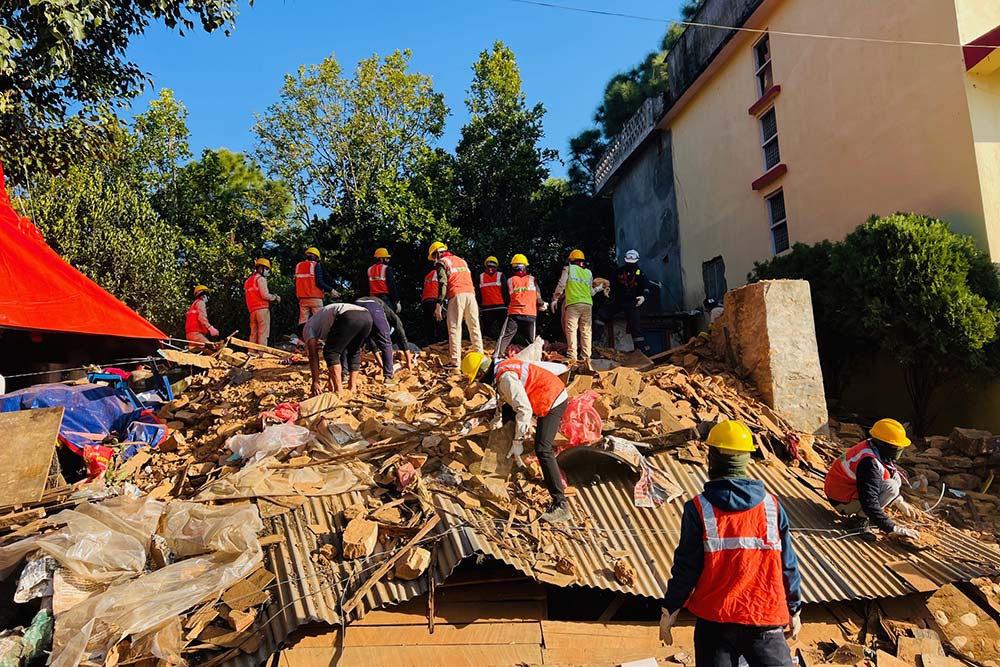
Text by Avant Shrestha
The last decade can be deemed as an evolving phase for the entrepreneurial ecosystem in the country. As more start-ups sprout and more entrepreneurs start to dabble with innovative ideas and ventures, it’s fair to claim that the support system for these has also increased.
Starting a business is always tough. It’s even tougher in a country like Nepal which lacks the infrastructure, market place, expertise, investment, unhealthy competition and of course the barrage of regulatory hurdles. In-spite of such challenges, the country is experiencing a significant increase in young entrepreneurs to create and build their own businesses.

Amun Thapa
CEO, Sasto Deal
Amun Thapa, CEO of Sasto Deal recalls, “In 2013-14 when I went to colleges, I would ask students, ‘how many of you would like to be an entrepreneur?’ Very few raised their hands. But today when I ask the same question, almost 99% raise their hands. And I think that has been a significant changed over the years.”
Start-ups here face financial hurdles and lack of proper mentorship which is often detrimental to the growth of a young business. Today however organisations and stakeholders in the ecosystem are turning the heel and offering financial and long-term support system that puts the entrepreneur first. Organisations like Dolma Impact Fund, Business Oxygen, One 2 Watch, Biruwa Advisors are a few that offer venture capital and also bridge the divide between qualified mentors and start-ups.
Over the past 6-7 years, business incubation and accelerator programs have been actively helping entrepreneurs and young companies grow. Business incubator and accelerator are often assumed to represent the same concept, but they are vastly different to one another.

Williem Grimminck
Founder and Managing Director, One 2 Watch
Williem Grimminck, Founder and Managing Director of One 2 Watch, an investment management company that invests in SMEs in Nepal with high growth potential, explains, “A business incubator is where you incorporate ideas into business. And an accelerator picks up a company that is already in business, and aims to accelerate it to a high growth path.”
Business incubators and business accelerators provide advice, guidance and various forms of support for businesses in the start-up phase. Through business incubation hubs and business accelerator programs, entrepreneurs have the opportunity to obtain advice and guidance from professionals and mentors. Also networking opportunities are aplenty.
A business incubator aims to nurture the business in its start-up phase, allowing it to develop at its own pace. It provides new businesses with office space and shared facilities such as telecommunications systems and internet connections in a dedicated building.
Business accelerators aim to turn business ideas into prototypes or products that are ready for market in a stipulated timeframe. At the end of the period, entrepreneurs have the opportunity to make a pitch to potential investors and venture capitalists to obtain funding.
According to Grimminck both the incubator and accelerator programs are not straightforward and we have to realise that the company goes through multiple cycles of incubation. “When the market changes and new technology enters the market, the companies have to be re-incubated. There is a multiple loop in the lifecycle of a company,” expresses Grimminck.

Shabdha Gyawali
Investment Director, Dolma Impact Fund
According to Shabdha Gyawali, Investment Director of Dolma Impact Fund, a private equity fund that invests in Nepali startups, such programs are vitally important for young companies, not just for access to money but it is crucial for the companies to obtain the right mentorship and to get the business model right. Grimminck supports the claim by adding, “Business accelerator and incubation programs are super important because Nepal does not have fully functioning ecosystem for companies to gain the resources and skills they require to grow.” He adds, “So what accelerators do for a company is that they build this sort of micro ecosystems and help replace or fix a lot of missing pieces of the ecosystem that can gradually build up a company and hence the ecosystem here in the nation.”
There are lots of things that are not taught in schools and colleges regarding starting or even running a business. According to Thapa, not everything is written in textbooks, so what happens in a business incubator and accelerator is that there will be seasoned entrepreneurs that will tell you exactly what you are going to go through and help you in the due process.

Richa Rajbhadari
Founder, The Mint Studio
Richa Rajbhadari, Founder of The Mint Studio was part of the business accelerator program with One 2 Watch in 2018-19. She claims that the accelerator program is a fast track course that helps the company gain exposure but at the same time with proper mentorship, you get to learn more about your company and the industry you are trying to penetrate. Rajbhandari claims, “The programs are created to mitigate the chance of failure by fine-tuning your business through the right mentorship, networking and doing due-diligence.”
It is an established notion that in order for a start-up to scale up, financial injection is vitally important. However, this does not necessarily mean the company can be deemed ready for an investment. So the question is; how do we know if a start-up is investment ready?
The following three factors can be deemed as the major point of interest for the potential investors looking into a company:
The first aspect is a solid ‘business model’. However, even if it is always the norm, investors generally do not just bank on the business model alone as business model can always change as the company grows. As a result, the core team and the vision is given major emphasis. For potential investors, the team is very important because they are investing on the work and the vision of the team. Gyawali states, “I believe the team is the number one prerequisite to back a deal.”
The second aspect is definitely the scalability of the company. According to Biruwa Advisors, “The start-ups must show the potential of being scalable and sustainable in the long run. Few important things to consider are – problems the start-up is solving, target market, target market size, whether or not the idea can be implemented to other markets and factors that affect sustainability of the start-up.”
The third aspect would be the ‘exit’ for the investors. Investors are generally wary that they might not be able to exit if the company shuts down. “If I am to make an investment today, will I be able to exit sometime in the future? These are some of the factors we look at when a company files a due diligence report,” explains Gyawali. “The reputation matters as well. For example, an investor would not want to be involved in a company that might dent his or her reputation in the long term. Grimminck states, “There has to be a process in which the start-up has de-risked the company so they have mitigated the risks. That’s how an investor is comfortable putting money in the company and that’s pretty much how an investor will be confident that the company is ready to scale up.”
Talking about the current scenario of the entrepreneurial ecosystem, it is definitely not a lack of talent in the country. However, there needs to be more recognition for entrepreneurship. Entrepreneurs say one of the major hurdles is the lack of ‘risk appetite mind-set’ among investors.
There are very few angel investors in the country but the diversity among the investors have to go beyond the ‘3Fs’ (friends, families and fools). Access to finance is also a challenge because without collateral, a bank does not entertain the idea of giving loans.
And while there are some investors and venture capitalists that genuinely believe in an idea and the objectives of a start-up, however there is a major misconception around quick returns. Investors look for quick returns in start-ups like in the property business. Many entrepreneurs have complained that the investor treats start-ups as a piece of land. They generally look for a quick return and an exit. This can be attributed to the trust factor.
There is a general lack of trust among stakeholders in the ecosystem because the ‘land valuation’ mentality has been the benchmark for years. Gyawali elaborates, “People don’t understand how start-ups function because there is a lack of exposure. For example, we do not have a track record of investors investing in a company and having a good return. So what we need in Nepal is a track record of investing in a start-ups and making good money.”
Then there are countless and sometimes impractical regulatory hurdles in the country. But times are slowing changing. Gyawali states, “I think government needs to keep up with the private sector. As for regulatory reforms, either they should revise their policies or they should understand the situation as they regulate it. It doesn’t make sense to follow regulations that were passed 27 years ago as it will not make sense to follow today’s regulation 5 or 10 years down the line as technology and ideas are sure to change and evolve.” For example, the country is experiencing a steady rise in IT start-ups but their working is hindered by outdated company acts.
Nepal’s business sector has always been plagued by transparency, unhealthy business practices and competition. “We tend to blame everything on the government and stringent bureaucratic red tape,” explains Gyawali. But stakeholders in the entrepreneurial landscape and private sector should be ready to reform the status-quo as well. “There is a need to improve our systems and be more transparent. We need to create more trust. It’s not just the government; we also need to do some self-reflection and try to improve things on our side”.
The entrepreneurial ecosystem is improving, as Gwayali explains, “When I started working in the space almost 10 years ago, you didn’t hear about many start-ups. But these days, plentiful start-ups and new ideas are coming up. Additionally, you also see, activities like, business pitches, accelerator programs and incubator programs which is very encouraging. The entrepreneurial ecosystem in the country is still in the nascent stage but it’s starting to fledge,” he adds.
While there are a fair number of ventures, Nepal still does not have a massively successful start-up story yet. Thapa says, “Even when we were starting, a start-up was an alien term. But today, we have figured out that loan is not the only option, there are other mechanisms such as venture capital. Now, people have a new confidence in starting a business.”





